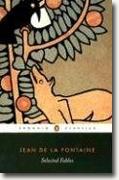Selected Fables
Jean de la Fontaine
book reviews:
· general fiction
· chick lit/romance
· sci-fi/fantasy
· graphic novels
· nonfiction
· audio books
· author interviews
· children's books @
curledupkids.com
· DVD reviews @
curledupdvd.com
newsletter
win books
buy online
links
home
for authors
& publishers
for reviewers

 |
Selected Fables Jean de la Fontaine Penguin Classics Paperback 304 pages August 2006 |
|
Like Aesop's fables and those by Phaedrus and Bidpai, Jean de La Fontaine's fables aren't merely childish tales. Their very simplicity hides the serious social commentary and sophisticated satire that was a hallmark of the poet's acumen and wit.
There is no one who hasn't heard of the saying "Pride comes before a fall." La Fontaine illustrates this with the tale of two mules: one full of himself because he works for the wealthy man and carries money, the other hauling grain sacks for the miller. When bandits set upon the two mules, they proceed to thrash the egotist and make away with the money, leaving the other mule well enough alone. When the first mule bemoans his fate, the second mule says, "If you worked for a mere miller, like me / You wouldn't be groaning in that ditch." The fable about the fox and crow tells a similar story. The fox flatters the crow and encourages it to sing so that it may open its beak and let fall the piece of cheese. Before leaving, the fox crows, "My dear sir, learn the hard way / That all flatterers live / At the expense of those with a credulous ear." Then there is the tale of the cicada who sang night and day all through summer. "I was singing night and day / For the pleasure of anyone whom chance / Sent my way." When winter came along and there was no food to be found, the cicada rushed to her neighbor the ant. While the ant was sympathetic, her policy was to never lend, believing instead in the principle that a lesson in self-sufficiency was the best help she could provide. "Singing, did you say? / I'm delighted to hear it. Now you can dance!" Once in a while, the meaning of a proverb gets turned on its head. We've all at one point or another used the term "sour grapes" to refer to someone who is envious of our success. In the fable about the fox and the grapes, when the fox tries hard but fails to reach the luscious-looking purple grapes high up on a trellis, he simply shrugs the incident off, telling himself, "Ah well, it's more than like they're not sweet / Good only for green fools to eat!" Thus, instead of whining and griping, he convinces himself that they're unripe and not worthy for him. Anthropomorphizing animals and teaching life lessons through them is a tradition that goes back thousands of years to the Vedic Sanskrit period. In mastering those literary traditions, La Fontaine proves himself a worthy successor of those legendary writers. The pen and ink decorations and illustrations in this Penguin Classics edition, from the 1842 Parisian edition, perfectly complement the playful nature of La Fontaine's verses, which have been superbly translated from the original French by James Michie. Originally published on Curled Up With A Good Book at www.curledup.com. © Sonali T. Sikchi, 2006 |
|
|
|
 Click here to learn more about this month's sponsor! |
|
| fiction · sf/f · comic books · nonfiction · audio newsletter · free book contest · buy books online review index · links · · authors & publishers reviewers |
|
| site by ELBO Computing Resources, Inc. | |
 As a collection drawn from La Fontaine's 230-odd fables across twelve books, Selected Fables represents one of the high points of seventeenth-century European poetry. However, La Fontaine's deft hand ensures that charm was not overshadowed by pedantic instruction. In his own lifetime, the collection ran into 37 editions, and it has since achieved an almost proverbial status.
As a collection drawn from La Fontaine's 230-odd fables across twelve books, Selected Fables represents one of the high points of seventeenth-century European poetry. However, La Fontaine's deft hand ensures that charm was not overshadowed by pedantic instruction. In his own lifetime, the collection ran into 37 editions, and it has since achieved an almost proverbial status.